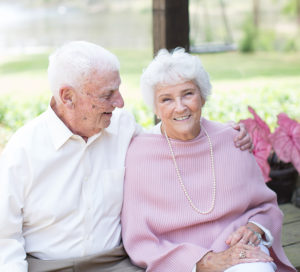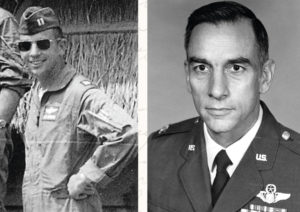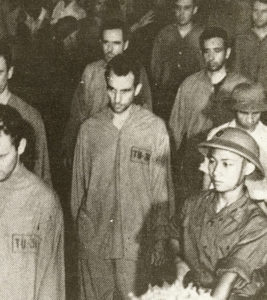By KATIE EUBANKS
Surviving separation, capture, and the Hanoi Hilton

“We knew we’d be all right together when we got back together, and that was true,” said Louise Harris, right, of she and her husband Col. Carlyle “Smitty” Harris’ eight-year separation while he was imprisoned in Vietnam. Photo by Lauren Zuelzke
In honor of Veterans Day, MCL recently interviewed Tupelo residents Col. Carlyle “Smitty” Harris, a retired Air Force pilot, and his wife, Louise, about the hardest eight years of their lives (April 1965–February 1973), when Col. Harris was imprisoned at the infamous “Hanoi Hilton” during the Vietnam War.
You can read more in Col. Harris’ book, co-authored with Sara Berry, titled “Tap Code: The Epic Survival Tale of a Vietnam POW and the Secret Code That Changed Everything,” available on Amazon or at stores in metro Jackson.
This interview has been edited for space and clarity.
MCL: Col. Harris, how did you spend most of your time at the prison?
Col. Harris: We spent some part of each day doing whatever exercise we could … Running in place, or pushups or sit-ups … We spent more time communicating with other POWs than anything else … Often we were in solitary confinement or with one cellmate. If we tried to use voice, we immediately got the guards’ attention … So we found various ways to communicate covertly.
MCL: The tap code was one of the biggest ways you and your fellow POWs encouraged each other. Did the guards figure out what the tapping was?
Col. Harris: Yes. … So we found lots of other ways that they didn’t hear. … If we were ever given the opportunity, say, to sweep down a cell or the corridor between cells, we swept in tap code. If we were ever out chopping wood, we chopped in tap code. … we would be coughing and sniffing (in tap code).
MCL: What kind of physical mistreatment did you go through? (Reader discretion is advised.)
Col. Harris: A lot of the time up there … was pure boredom. But there were lots of times when they tried to (make us) write a statement that was favorable to the north Vietnamese, (or) meet with people outside that were favorable to their cause. And we refused .… if they asked capabilities about our aircraft, we’d simply say we couldn’t answer that. Pretty soon they got angry and would knock you off the stool two or three times, and if you kept that stance up, which we all did … most of the guys that I know … you would end up with some really heavy torture.
By heavy torture, I mean having ratcheted handcuffs put on your forearms behind your back, and the guards would start banging them together until I’m sure the bones in the lower arm were bent together, and just leave you that way. The pain was terrific.
And if that didn’t work, they had — we called it the rope trick. … Essentially, they tied your hands behind your back, and sat you down on concrete or something, and tied your legs together, and tied a rope around your neck, and started pulling your head down toward your knees, and with your arms behind your back, some of them would start pushing your arms up, until sometimes they pushed them completely out of socket. … I don’t know if anyone was able totally to defy the north Vietnamese after some version of the rope trick.
They also used beatings — usually in the beatings they would hold you down and beat you on your back and buttocks with a long strip of rubber tire about an inch in width.
(But when) we finally wrote something (for them under duress), we put slang in it, or a double meaning, so that at the highest levels of their government, they saw that if it was released, it would be contrary (laughs) — it would affect the world opinion to their detriment.
Sometimes it would be a year, sometimes it would be a month, and they would try again to get us to do something that we refused to do.

Left: Col. Harris in March 1965, just one month before being shot down and captured. Right: Col. Harris in November 1973, several months after his release.
MCL: How did you get your first letter to Louise?
Col. Harris: I had been there I guess a couple months, and all of a sudden, I was pulled out of solitary confinement and put in a cell with three other American POWs. (They) gave us an opportunity to write letters home, which we jumped right on, but the reason … was to take the letters to a conference they had scheduled with foreign diplomats to show that they were complying with the Geneva agreements that they had signed.
A great diplomat, a lady, as she was leaving the room (at the conference), picked one off the table, and it was my letter … (She) eventually mailed it from England, and it got back to Louise sometime a month or so later.
MCL: So those other letters never made it home. They were just props.
Col. Harris: They were props.
MCL: Louise, when did you find out your husband had been shot down?
Louise Harris: We were living in Okinawa. The morning after he was shot down, I received a call from my mother in the United States. (Then the military) confirmed that he had been shot down, and that no parachute had been seen, and that no communication had been received from him.
I said, “Well, he’s alive. If he were dead, I’d feel it.”
They said, “Well, we’ll get things organized and have you on the next plane out.” I said, “Absolutely not. I am eight months pregnant.”
(When our son, Lyle) was six weeks old, I had decided I would come to Tupelo to be near my sister and her husband.
MCL: How did you keep from going crazy with worry?
Louise Harris: I am, as he is, very optimistic, and I stayed busy with three children.
In August after he was shot down in April, our local postmaster called, and he said, “Mrs. Harris, I may be nuts, but I think I have a letter here from your husband.” So I got my niece to come over, and I raced to the post office, and sure enough it was the letter from Smitty.
I raced home, and the children and I read it together … They weren’t quite sure what they were excited about, except the girls were aware enough to know it was a letter from Daddy. Then I called Smitty’s mother and dad, and my mother and grandmother, and then I called the Pentagon.
They changed his status … to “detained by hostile forces.” I began to get a little more cooperation, and if they got a bit of news by whatever source, it made me privy to a little bit more information. … Any tiny drop of information became a lifeline.

Col. Harris, center, in the Hanoi March a few
months after capture. He’s down about 30 pounds. The U.S. government acquired this photo from the Japanese government and passed it on to Louise.
MCL: Was that the only letter you got from your husband?
Louise Harris: No. But they were very scarce. … And while we were able to mail them a letter a month, he didn’t get a letter a month. (Later) we were able to mail a package a month, and he didn’t get those either.
(But any information the U.S. government got) that wasn’t classified, (I received). And even occasionally I would get a bit of classified information.
And daily with the children we would talk about my husband as if he was going to walk through that door any moment. … we talked about what he liked and what he didn’t like. … We’d laugh about the things he’d laugh about … So when he did come home, he wasn’t a stranger. He was Daddy.
MCL: Col. Harris, what was the hardest part of those eight years?
Col. Harris: Torture. (laughs)
I’ve always been an optimist. And I always thought that I would be home with my family in about six months or so. And that kept extending and extending, but I never gave up hope. As we were held and held, we became stronger, and they were never going to break our will.
The other thing that sustained us the whole time was faith. … when we were really in bad straits, and had no one to turn to, we would pray. Of course we didn’t get the immediate miracles that we wanted, but we gained in ways that were better than we could have imagined — having hope, and knowing we had a communication with our God, and the end result is all those things that we prayed for happened. And here I am talking to you on the telephone with my wife.
MCL: How and when did you reunite with your family?
Col. Harris: February 12, 1973, was my release date. And we flew to the Philippines, to Clark Air Base (for medical work and debriefing), and I got to call Louise. And then, on the 16th, I flew from Clark Air Force Base, landed in Hawaii, then California, and finally on a plane to Maxwell Air Force Base in Alabama, in Montgomery.
I landed about 2 o’clock in the morning, and there were already a couple hundred people … welcoming me home with signs and yells, and as I happened to be the senior POW on that flight … they pushed me up to a microphone to say a few words, and I don’t know what I said, but Louise was in the backseat of a (staff car) that pulled up right behind me. (laughs) I didn’t know it … and in a few moments I was with her in the automobile, and they took us to our quarters on base.
Louise Harris: Where the rest of our family was.
MCL: What do y’all think is the biggest thing God taught you over those eight years?
Louise Harris: Patience. (laughs)
Col. Harris: Well, we knew we always had someone to turn to. No matter what.
Louise Harris: We knew we’d be all right together when we got back together, and that was true. From that very moment, we were OK.
Col. Harris: And I met my almost 8-year-old son.
Louise Harris: For the first time.
MCL: What was that like?
Col. Harris: Oh, that was wonderful. (When I first hugged him) he didn’t really hug back, but that didn’t bother me — I knew it was the first time he’d seen this stranger. (Later) I opened my arms, and he came running over and jumped in my arms and gave me a hug. And we’ve had a wonderful relationship ever since.
MCL: Col. Harris, how are you able to share so openly about your experience in Vietnam?
Col. Harris: I think mainly because we made so many close, close friends. I use the word “brotherhood,” I guess. And they’re so valuable to us even today. A close relationship with our God, a confidence in ourselves that we can stand up to just about anything … (We) gained from the experience.

